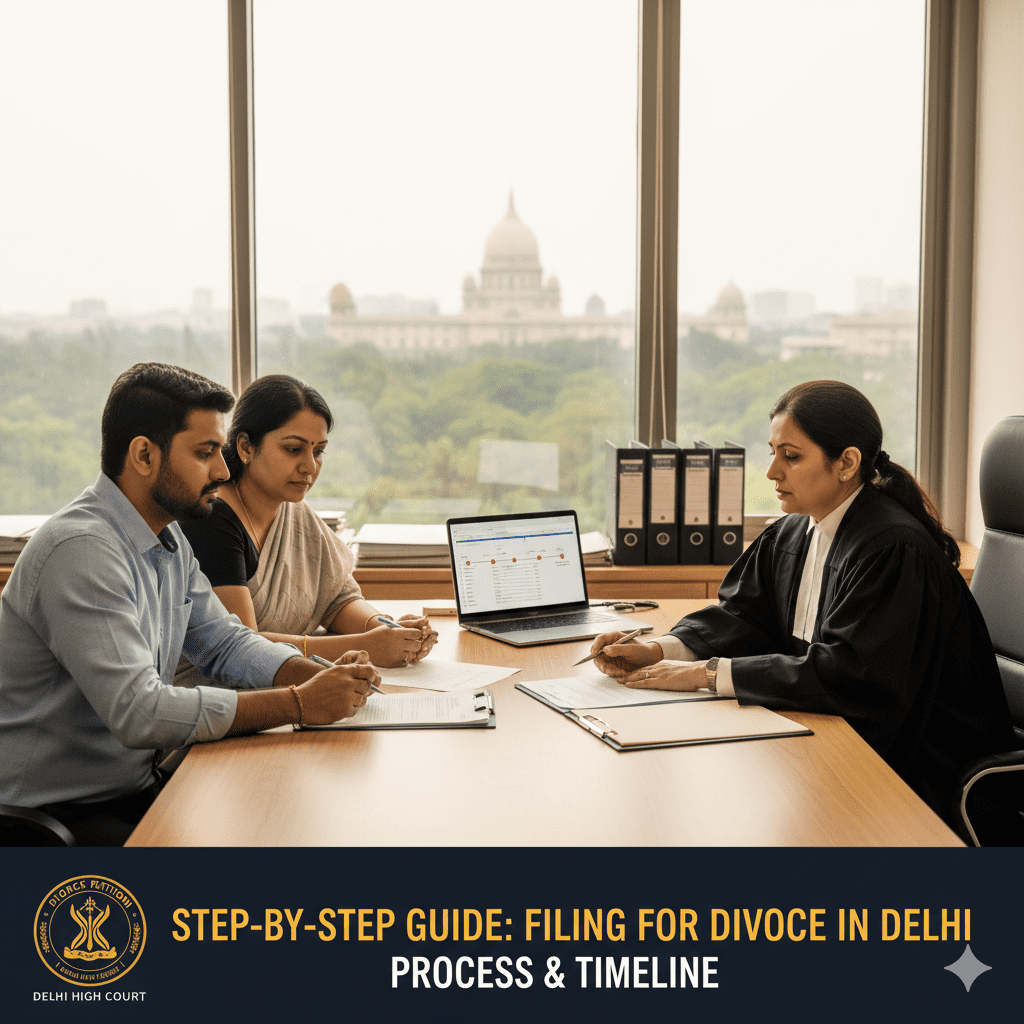Introduction
Divorce is never an easy decision, but understanding the divorce process in Delhi can make it less stressful. Whether you’re seeking a mutual consent divorce or contesting a divorce case, having the right legal guidance and knowing each step helps you save time, money, and emotional energy.
In this guide, our experienced divorce lawyers in Delhi explain the complete procedure, legal requirements, documents, and time involved in filing for divorce under Indian law.
Types of Divorce in India
Before filing, it’s important to understand which type applies to your situation:
Mutual Consent Divorce (Section 13B, Hindu Marriage Act, 1955)
Both husband and wife agree to end the marriage peacefully.
Usually completed within 6 months to 1 year.
Contested Divorce (Section 13, Hindu Marriage Act, 1955)
One spouse files for divorce against the other due to reasons like cruelty, adultery, desertion, etc.
Takes longer (can be 1–3 years depending on case and evidence).
Step-by-Step Divorce Filing Process in Delhi
Step 1: Consultation with a Divorce Lawyer in Delhi
Meet an experienced family lawyer to understand your rights, grounds for divorce, and required documents.
Tip: Choose a divorce lawyer in Delhi NCR who regularly handles family court matters — this helps in faster case filing and smoother hearings.
Step 2: Drafting & Filing the Divorce Petition
Your lawyer will draft the divorce petition mentioning grounds (e.g. cruelty, desertion, etc.) and file it at the appropriate Family Court in Delhi (depends on residence/jurisdiction).
Documents generally required:
Marriage certificate
Proof of address of both parties
Passport-sized photos
Marriage photos
Income and asset proof
Evidence supporting the grounds for divorce
Step 3: First Motion (for Mutual Divorce)
In a mutual divorce case, both parties appear before the family court for the first motion.
The court records statements from both sides and gives a 6-month “cooling-off” period.
Note: The court may waive this period in certain cases if both parties insist and there is no chance of reconciliation.
Step 4: Second Motion & Final Hearing
After 6 months (or earlier if waived), the couple appears again for the second motion.
The court reviews all details and, if satisfied, grants the final divorce decree.
For contested divorce, this stage involves:
Exchange of evidence
Witness statements
Cross-examination
Final arguments
Step 5: Court Decision & Divorce Decree
Once all proceedings are complete, the Family Court in Delhi issues a divorce decree, officially ending the marriage.
This decree allows both individuals to remarry or move on legally.
Timeline Overview
| Type of Divorce | Approx. Duration | Key Factors |
|---|---|---|
| Mutual Consent | 6 months – 1 year | Both agree & cooperate |
| Contested Divorce | 1 – 3 years | Complexity, evidence, court workload |
Where to File Divorce in Delhi
You can file the divorce petition in the Delhi Family Court within jurisdiction of:
The place of marriage, or
Where both parties last resided together, or
Where the wife currently resides.
Example courts: Patiala House, Tis Hazari, Karkardooma, Saket, Dwarka, and Rohini Family Courts.
Expert Legal Tip
A professional divorce lawyer in Delhi can help:
Draft strong petitions
Negotiate mutual terms (alimony, custody, maintenance)
Represent you effectively in court
If you’re considering divorce, it’s best to get legal advice early — before taking any step emotionally or legally.
Final Thoughts
Filing for divorce in Delhi involves multiple legal and emotional stages. With expert support and clarity about each step, you can move forward confidently.
Need help? Contact our Delhi family law experts for consultation.
Get guidance from experienced divorce lawyers in Delhi — we ensure your case is handled with care, privacy, and professionalism.


